|
|
|
Sort Order |
|
|
|
Items / Page
|
|
|
|
|
|
|
| Srl | Item |
| 1 |
ID:
155469
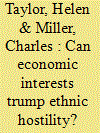

|
|
|
|
|
| Summary/Abstract |
Will China’s rise be peaceful? One of the key reasons for an optimistic outlook is the extensive economic ties which exist between China and its neighbors. According to a venerable strand of thought among policymakers and scholars alike, trading ties ought to foster bonds of amity among nations and thus reduce the chances of war. Here, we test this proposition using spatial economic data and survey research on opinion toward China as a security threat in Australia. The structure of Australia’s economy, its reliance on exports to China, and the concentration of these exports in a small number of sectors make it an ideal venue for such a test. Consistent with previous literature on public opinion and globalization, but in contrast to an individual interests based account of the trade–peace relationship, we find that outgroup hostility, not economic interdependence, is the key factor in shaping voters’ fears of a Chinese security threat.
|
|
|
|
|
|
|
|
|
|
|
|
|
|
|
|
| 2 |
ID:
189012
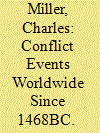

|
|
|
|
|
| Summary/Abstract |
Quantitative datasets of international conflict skew temporally to modern times and geographically and culturally to the West. Yet post–1815 conflicts featuring Western actors are only a small part of the history of warfare. Many scholars have bemoaned the potential selection bias which this introduces to studies of the causes and effects of military conflict, but as yet quantitative datasets which remedy both these temporal and geographic shortcomings have been lacking. Some datasets have expanded the scope of existing offerings temporally and others spatially, while others have attempted to expand both but with an important lack of detail in terms of location, participants, timing and outcomes. This dataset sets out to remedy the deficit. Using military history’s most extensive encyclopedia of conflict events, we have created a dataset of conflict events spanning the globe and a timescale from 1468BC to the invasion of Iraq in 2003, complete with precise geographic coordinates, year, participants and outcome. We demonstrate the promise of this data-set by using it to assess the frequently asserted relationship between conflict history and economic development, combined with Nordhaus’ GECON sub–national wealth data and historical data on population density from the Netherlands Environmental Agency.
|
|
|
|
|
|
|
|
|
|
|
|
|
|
|
|
| 3 |
ID:
187471
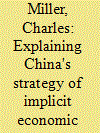

|
|
|
|
|
| Summary/Abstract |
The recent ‘trade war' between Australia and China has understandably sparked fear amongst Australian policymakers, voters and businesses. China's alleged economic coercion towards Australia has the strange property that Chinese leaders are not making any clear explicit demands of Australia. Moreover, this behaviour follows a pattern in recent Chinese dealings with other Asia-Pacific states. Why would a state initiate economic coercion without making clear demands? In this paper, I offer an explanation, building on the logic of audience costs in wars of attrition. I suggest that China's strategy of economic coercion without explicit demands serves a key strategic purpose. Omitting specific demands makes the outcome of any given dispute less clear and hence makes it easier for either side to claim victory. This negates a key advantage which democratic states have in bargaining with autocratic adversaries—the fact that their audience costs for backing down are usually higher, which makes them less likely to initiate but more likely to win international disputes. Implicit economic coercion should therefore be a strategy which is primarily targeted at China’s democratic trading partners. I examine the record of Chinese uses of economic coercion in the past and find that this pattern finds much support.
|
|
|
|
|
|
|
|
|
|
|
|
|
|
|
|
| 4 |
ID:
143327


|
|
|
|
|
| Summary/Abstract |
The sunk costs fallacy is an important concept in the academic and policy worlds. It has helped explain consequential national security decisions such as the escalation in Vietnam and the surges in Iraq and Afghanistan. While previous analysis of sunk costs in international relations has made no distinction between financial and human sunk costs, there is evidence in psychology that people treat human lives and financial costs differently. The consensus in the casualty sensitivity literature is that human sunk costs should lower support for a conflict, but there is as yet no evidence on whether financial costs operate in the same way. Using the Environmental Protection Agency’s value of a statistical life to equalize human and financial costs, we create survey experiments through Mechanical Turk and GfK/Knowledge Networks about a hypothetical US military intervention to test if financial and human costs have the same effects on public opinion. We find that public reaction to sunk costs is contingent on the type of costs incurred. Consistent with the growing ‘sunk costs skeptic’ literature we find no evidence that any sunk costs induce greater commitment to a mission. Where the US contribution to the conflict is purely financial, sunk costs induce a desire to cut losses. When intervention involves US lives, sunk costs make no difference to the level of support. Finally, contrary to the implicit assumptions of past policymakers, ex ante levels of public support for sending troops and sending money are indistinguishable. These findings hold true both in situations involving high Iraq War level sunk costs and low Somalia-style costs.
|
|
|
|
|
|
|
|
|
|
|
|
|
|
|
|
| 5 |
ID:
153314
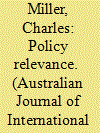

|
|
|
|
|
| Summary/Abstract |
The academic international relations community has come under fire, both in Australia and overseas, for its supposed irrelevance to real-world issues. Recommendations have been made for ‘bridging’ this ‘gap’ between the scholarly and policy worlds. This article takes a sceptical look at some of these recommendations. While this article argues that international affairs academics should be judged on their ability to provide value to society, it also notes that the best way to do so is to capitalise on the academy’s comparative advantages in order to produce high-quality inputs to the public debate. This article expresses concern that some of the recommendations put forward to bridge the gap may, by compromising impartiality, excessively curtailing the time frames for good research, and neglecting theoretical and methodological rigour, run the risk of reducing academia’s value to society.
|
|
|
|
|
|
|
|
|
|
|
|
|
|
|
|
| 6 |
ID:
134247
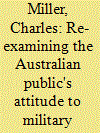

|
|
|
|
|
| Summary/Abstract |
Australia, like most other developed democracies, is often alleged to suffer from ‘casualty phobia’. The perception that the Australian public will not tolerate casualties in foreign conflicts has shaped the decisions of both civilian and military policy makers. Measures taken to protect Australian forces from casualties may, for instance, also serve to increase the risk to civilians in the country to which they are deployed. The USA underwent a similar debate some years ago. Innovative public opinion research techniques—especially ‘survey experiments’ which allow researchers to establish causal relationships by consciously manipulating one variable while holding others constant—have established that the American public are not reflexively casualty-phobic and that the impact of casualties on public opinion can be outweighed by other factors, such as the public's confidence in the mission's overall success. In this article, the author replicates one of the key survey experiments from the US debate, suitably adapted to Australian conditions, with a nationally representative sample of Australian voters. The author finds that the same pattern holds in Australia as in the USA: casualties do lower public support for a given mission, but the mission's chances of success matter more.
|
|
|
|
|
|
|
|
|
|
|
|
|
|
|
|
|
|
|
|
|